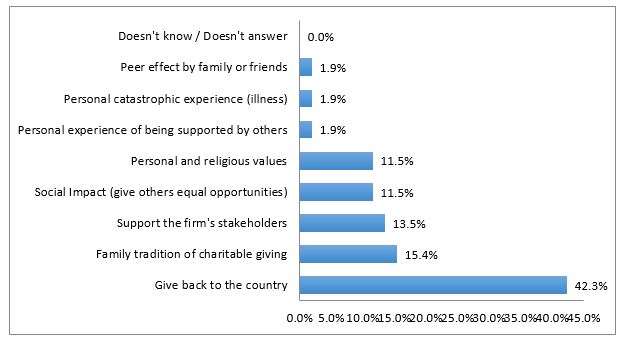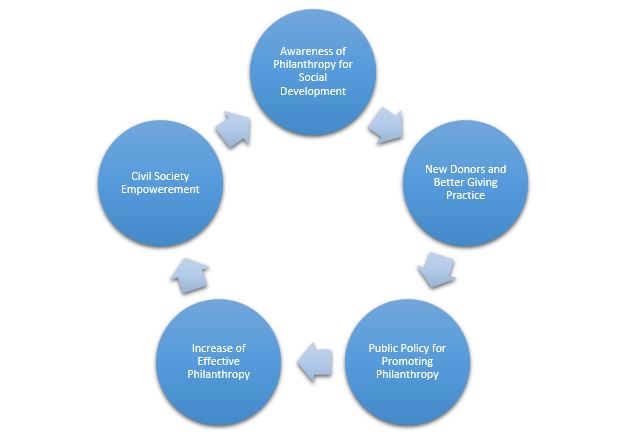For the past few decades, a large and narrow country in South America has been calling international attention for its political and economic progress. Chile has shown democratic stability and the highest degree of social progress in Latin America in areas like medical care, personal safety, reduction of poverty, and education coverture. But while the GDP per capita in Chile has increased to $15.732 USD, the country has a Gini index, which measures the degree of inequality in family income among a nation’s residents, of 50.8 — making it the 14th most unequal nation in the world, ahead of Argentina, Peru, and Mexico, and the most unequal in the OECD.
Today, Chile faces “second generation” challenges. Quality rather than access is needed, particularly in health and education, and a great challenge remains to integrate all inhabitants into the well-being that economic progress has brought to the country. Therefore, Chile sits as an interesting case in which to study how philanthropy and civil society can contribute to development by creating innovative solutions to complex social problems and attending to groups of the population whose needs are not addressed by certain public policies.
Data of private giving, as reported by the Chilean tax agency, shows donations represent 0.12% of Chile’s annual GDP ($220 million USD) — rather low but increasing in amount and number of donors during recent years. Vision and Practice of Social Donations by Business Owners, a study released last June by the new Center for Philanthropy and Social Investment at Universidad Adolfo Ibañez, shows that not only are the numbers of donors and donations growing, but Chile is experiencing a transition from an anonymous, Catholic-influenced, “giving-the-check” practice to more strategic philanthropic giving focused on the application of entrepreneurial skills to investments in social good.
The study, based on one-on-one interviews with 41 leading high net worth business leaders (HNW), outlines a series of elements that indicate a high commitment to contributing to social causes.
All of the respondents give permanently to social causes, and 51% of them give through an institutionalized structure like a family foundation, corporate foundation, or independent foundation with third parties associates. As Graphic 1 shows, motivation to give is strongly related to a sense of moral duty to give back to the community and to give others the opportunities they feel they had to develop themselves. As one of the high net worth individuals said in the survey, “I feel uncomfortable living in such an unequal country where people can’t really have the same opportunities.”
Graphic 1: Motivations for Giving from High Net Worth Business Leaders
Source: “Vision and Practice of Social Donations by Business Owners,” Center for Philanthropy and Social Investment of Universidad Adolfo Ibañez, June 2015
While there is a willingness to give driven by multiple motives, there are a series of barriers that must be overcome in a transition to an effective philanthropic practice. The study identifies four main challenges:
- The lack of public awareness of the value of philanthropy and of civil society for social development and social cohesion (and the lack of data in the field)
- The lack of donors´ trust in the capacity of NGOs due to poor management
- The tax incentive system — donors see it as too limited and complex, particularly for individual giving
- The lack of professional giving practice, in which the use of tools to assess results and impact, is rarely incorporated
At present, as private giving is increasing, we are in a time of great opportunity in Chile for the development of effective philanthropic practices. The conditions are right for the country to move from being known by its recent economic progress to being recognized by its philanthropic growth. But a virtuous cycle (Graphic 2) is needed for this transition to take place.
Graphic 2: Theory of Change for Developing Effective Philanthropy in Chile (Building a Virtuous Cycle)
Source: Magdalena Aninat, The Center for Philanthropy and Social Investments, UAI.
The first step in the cycle is to create awareness of both the potential that philanthropy has to improve the lives of direct beneficiaries, and also to build positive social habits, such as collaboration and social trust. This awareness can help incorporate new donors, develop better giving practices, build knowledge, empower role models, and encourage rigorous assessment of social impact. In such a cycle, an increased understanding of private giving as a tool for social cohesion and a better giving practice should encourage the development of better public policies for promoting effective philanthropy. And in the end, this awareness, better practice, and better policies should, in turn, foster effective philanthropy and empower civil society as a relevant actor of social development.
This post is part of an occasional series on the CEP Blog providing international perspectives on philanthropy and foundation effectiveness.
Magdalena Aninat is the founder and director of The Center for Philanthropy and Social Investments, School of Government, Universidad Adolfo Ibañez, in Chile. Follow her on Twitter at @maidaaninat.
The studies mentioned in this article are available on the Center’s website.




